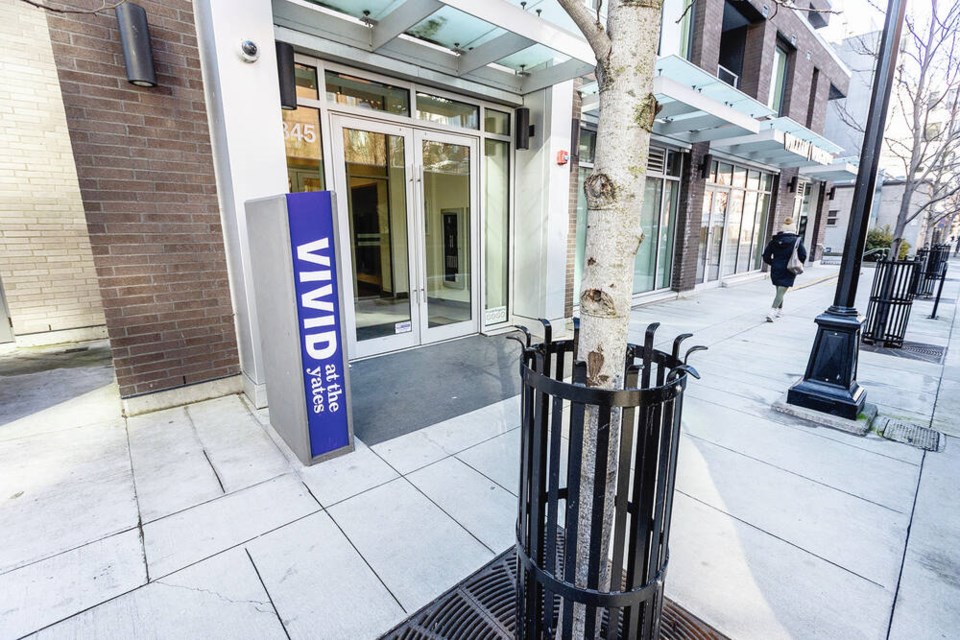After many affluent owners of multiple properties scammed B.C. Housing by buying publicly subsidized units in Victoria that were supposedly for middle-income, first-time buyers, the NDP government had a problem.
It centred on the Vivid building in downtown Victoria, which opened in 2021. Ample evidence started emerging soon after that buyers were bypassing restrictions designed to keep them available for middle-income people. Much legal work started internally in government to rectify the situation.
A key issue in the recovery effort was whether to come clean and admit the government had been played, or stay mum while the legal proceedings played out.
CBC reporter Jason Proctor, who broke the Vivid story last spring based on the blizzard of lawsuits that developed, followed up on it this week after getting reams of government documents via freedom-of-information.
They confirm that the Housing Ministry — headed by NDP Leader David Eby — opted to keep quiet. It wasn’t until Proctor combed the court registry that it became clear to taxpayers that a key NDP affordability move aimed at the “missing middle” part of the housing market had blown up in their faces.
Chard Developments got a $53-million low-interest loan from the government to build Vivid. It was to lower construction costs so that savings could be “passed on to qualifying buyers so units could be purchased at below-market prices,” the government said.
Units were supposed to be offered only to people who made under $150,000 a year, who didn’t own any other property.
But the court files are full of government claims that multiple buyers owned many other properties and earned more than the limit. Some of the units were rented out, another breach of the rules.
The Housing Ministry has been chasing those buyers and bought some of the units back at original prices. But through much of the effort to recoup, it never said a word about the scandal publicly.
The decision was made despite a recommendation from senior B.C. Housing officials to make it all public. Proctor located a document showing that two years before the story broke, communications officials warned there was a “high risk” it would become public and that people could take a negative view of the agency’s failure to prevent abuse or fraud.
They wrote a plan to acknowledge the situation and show a “swift and fulsome” response to it. But the decision was made to keep quiet.
A senior B.C. Housing official wrote to Byron Chard, head of the company in 2022 as the legal pursuit started, stating they had “provided the ministry with all of the information [but] had decided against a public release at this time.”
Elsewhere, there is reference to a $19-million loan B.C. Housing requested from the Provincial Rental Housing Corp. in order to buy back multiple units from buyers who got caught violating the conditions and agreed to return their suites.
That money will be recouped in resales to the people the affordability plan was originally supposed to be helping.
That loan, the numerous ongoing lawsuits and the overall size of the information release — 4,000 pages — suggest that the Vivid scandal has occupied a huge amount of time, resources and money.
Eby’s first reaction when the Vivid story broke was to say that the pilot program behind the loan was created by the previous B.C. Liberal government.
“I cleaned up mess after mess after these guys left.”
But this is entirely his mess. He’d been housing minister for four years by the time Vivid opened and started selling condos to people who had no business living there.
He was the one who issued the news release when it was completed, congratulating himself for helping it happen.
The opening is “great news for families that will benefit and get a chance to own their own home, which they might not otherwise have had.”
But up to a third of the units were bought by people who may have bypassed the qualifications.
When Proctor’s first story broke, Eby told the legislature he was the one who led the pursuit of the culprits.
“I told B.C. Housing: ‘Go to court. Hold these people accountable.”
But he wasn’t proud enough of that effort to say a word about it for more than two years. Claiming credit for chasing suspected scammers would have involved admitting he got scammed in the first place.
>>> To comment on this article, write a letter to the editor: [email protected]




